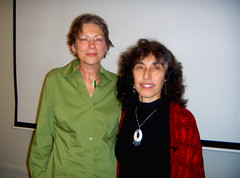On Friday, January 22nd, I headed to 402 Burrowes with other students and faculty in anticipation of seeing author Alicia Partnoy discuss her works and her past as an Argentinean prisoner of war. In her talk, “From Prison-Writing to YouTube: Testimonial as Tools for Survival,” Partnoy recounted her capture by the Argentinean army in 1977 for publicly opposing the government and their policies. After being locked up with hundreds of other female prisoners in a 9×9 meter cell in a prison called La Escuelita, Partnoy began to write poems, later published in her poetry anthology Revenge of the Apple, as a means of building what she calls “a bridge of solidarity” between her and her fellow prisoners. The sense of community formed among the female prisoners is one of the reasons Partnoy refers to literature as a “tool for survival.”
Partnoy is a huge part of the movement towards gaining recognition and demanding action for the disappearance of Argentineans that she says still occurs today. When asked why she felt it was so important for her to be a part of this cause, Partnoy answered, “We in academia can speak for others because we have the authority.” As an English major, I couldn’t have agreed with this statement more. What is the point of building a reputation as an author if not to speak for those who aren’t in a position to communicate their problems? This talk led me to think about how different our lives as Americans would be if our rights were not protected by the Constitution, and if we instead had to risk our safety to convey our thoughts.
Partnoy also discussed YouTube as a more democratic form of testimonial, which led me to believe that YouTube will play a large role in future testimonials. It is on YouTube, after all, that you can truly express yourself with little threat of censorship. And what better way to reach the masses about important social issues than through something as universal as YouTube?


This is a great story, Julia. Thanks for bringing it to our attention and contributing to the blog in this way.
I wonder if you have some examples of YouTube videos to which we could link that articulate a thoughtful and compelling position on an important social issue.
It would be great to embed a few examples in order to generate some discussion not only around the issues themselves but also about the limits and benefits of YouTube as a medium.